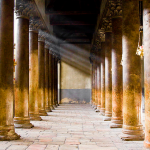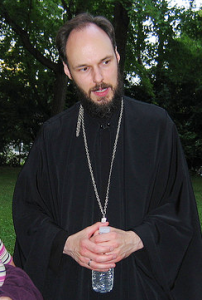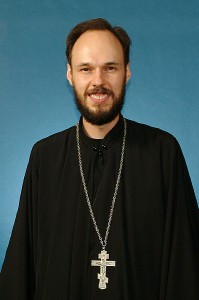by Fr. Geoffrey Korz

As a former member of the Anglican Communion myself, I very much appreciate both the traditions which led me to Orthodoxy, and the sentiment and love contained in this excellent article. Fr. Geoffrey is a friend of mine, and I’m only sorry I have not found and published this outstanding letter sooner! – Fr. John.
I was born and raised a proud Anglican. For generations, my family were patrons of churches, ardent monarchists, and defenders of all things English and Christian. So why did I leave Anglicanism nearly two decades ago, to travel a slow but sure path to the historic, Orthodox Church?
Years ago, my search for historic, English Christianity led me to read the Ecclesiastical History of the English Church by the Venerable Bede. What did I find? An early encounter between the evangelist Saint Augustine, and English king Ethelbert struck me as somehow strange: Augustine’s companions carried images of Christ, painted on boards – «icons» as they are commonly known.
That’s strange, I thought – that’s what Greeks and Russians do, not English Christians.
The reasons soon became clear. Until the eleventh century, the English Church shared more than a love of icons with the whole body of the Church: they shared a communion of beliefs, moral practice, and liturgical life with the Church throughout the world. This lasted for centuries, but it was not to last forever.
Even after the Schism of 1054 – the division between Rome and the rest of the Christian world – England remained in communion with the Eastern Orthodox. In 1066, the Norman Invasion, with backing from the pope of Rome, forced the submission to Frankish Rome of all English churchmen. [1]Rome had already broken communion with the Orthodox East, and changed the Creed and the Conciliar tradition of the Church by elevating one bishop – the Bishop of Rome – above all others.
Why did the English remain in communion with the Orthodox East? Not because the English (and the Irish, Scots, and Welsh, as we would call them today) disliked Rome. The English church was part of the Orthodox church, from its beginnings, until ?he purge of Orthodox bishops following the Battle of Hastings.
 The English were Orthodox, I realized.
The English were Orthodox, I realized.
So, why am I not?
Centuries later, by the time of the Reformation in the sixteenth century, England was ready for another division over the question of the national sovereignty of its religious life.
The English knew almost instinctively that something was not right with the idea of a single, Roman bishop claiming to rule the whole of Christendom, yet this issue became entangled with the desire of one English king -Henry VIII – to have a male heir. When the dust settled, England had a new religion, one which was no longer under Rome, one which was in communion with no one else in Christendom, one which had not returned to the Eternal wells of Christ’s historic Church.
Why does all this matter? It matters because the Church is the Bride of Christ. Since the Lord has only one Bride, it is not possible to come and go from the mystical union of the Church, and still be part of Her. Divisions are not simply matters of working out local issues and personal opinions: they are questions of eternal importance, questions of whether one is part of the Bride of Christ – His Church – or part of some other body that pretends to be so, based on certain reinterpretations of history, and personal slants on theology or moral questions.
It sometimes comes as a shock to people, that Orthodox Christianity doesn’t recognize rites and sacraments of Rome or of the Anglicans. Why is this? It arises out of the fact that when communion is broken, and beliefs are changed, new religions are formed. One African Anglican bishop recently suggested that North American Anglicans are not simply accepting diverse beliefs as they consider blessing same-sex unions: they are in fact creating a new religion. This is precisely the way historic Orthodoxy views the Schism of 1054, when Rome left the historic Church, and the further splintering of the Reformation.
Ironically, both Roman Catholics and Anglicans recognize the legitimacy of the Orthodox Church, the integrity of its teachings, its preservation of the eternal mysteries of ancient Christianity. Yet in the name of diversity, many western Christians simply ignore this fact, since it raises difficult questions, such as where is the Church? and why am I not in it?
The Orthodox Church recognizes that liturgical life forms beliefs, as well as reflecting them. The old Christian axiom, “lex orandi, lex credendi” holds true: the law (or rule) of worship is the law of belief. The two cannot be divided. When the Orthodox see liturgical revisions in Rome and among Anglicans, it is seen as inevitable that these both reflect and shape new beliefs. The outcome of this is clear to many faithful Anglicans and Roman Catholics: innovations in theology, as well as moral teachings, such as the questions of the priesthood, sexual morality, capital punishment, divorce, cremation, and the definition of marriage.
 Queen Elizabeth the first prided herself on not inquiring into men’s hearts, opting instead for unity of communion over unity of belief. The Anglican faith has spent five centuries in this mode. Rome is essentially this way today. Orthodox Christianity is not, and never has been. It preserves unity of doctrine, practice, and belief with those in the Church today, as well as all the saints throughout the ages, because the Orthodox Church exists eternally, outside time, and is not just an anachronism.
Queen Elizabeth the first prided herself on not inquiring into men’s hearts, opting instead for unity of communion over unity of belief. The Anglican faith has spent five centuries in this mode. Rome is essentially this way today. Orthodox Christianity is not, and never has been. It preserves unity of doctrine, practice, and belief with those in the Church today, as well as all the saints throughout the ages, because the Orthodox Church exists eternally, outside time, and is not just an anachronism.
Conversely, Anglicanism is built on the tradition of change, which cannot protect her from innovation. Traditional-minded Anglicans, fleeing redefined marriage or the ordination of women, cannot expect to find a safe harbour among so-called “continuing Anglicans”, or in the modern Church of England itself: they are based on the same revolutionary spirit of the Reformation. The only safe harbour for those who in their hearts seeks the historic Church is to return to the historic Church: the Orthodox Church.
Orthodoxy has been preserved in the face of centuries of persecution at the hands of pagan Rome, Islam, and Communism , and has faced down heresies for twenty centuries. Its Biblically- rooted worship preserves the same spirit as the earliest centuries of its existence. The same faith that brought the world the Holy Scriptures and defended its truth against heresies continues to run through its veins. It is unchanging and eternal, because it is the Bride of an Unchanging and Eternal Husband. It cannot recreate the early Church, because it is the same Church, alive and struggling, and giving life to our troubled and changing times.
The English tradition is Orthodox[2]. The true roots of Anglicanism can only be found in Orthodox Christianity. Augustine of Hippo told the faithful that we will never find rest, until we find rest in Christ; likewise, restless Anglicans will never find rest from the ever-changing storms of modernity until they return to the historic, Orthodox Faith. Canadian and American Anglicans in particular know the insecurity of spiritual lives lived in the shadow of modern pop culture, ever changing with the tides of popular opinion, fad, and fashion. Where can we find Christ, eternal and unchanging, the Alpha and the Omega?
The fact is, the historical reality of Christ’s Church remains undivided and unchanging, waiting with quiet patience for those who would return to Her for rest, stability, the fullness of Truth and joy. How long will those who are thirsty for this continue to visit empty wells, and remain restless and unsatisfied? The search for the Eternal cannot find satisfaction in hundreds of man-made sects, all reflections of the temporary world of our century, or centuries past. Christ has given His historic Church to the world, to preserve her in this sinful generation, and it is only in Her that the fullness of Christianity can be found.
************************************
For Further Reading
-
Moss, Vladimir (Anthony). Saints of Anglo-Saxon England, Vols. 1 to 3. Seattle Washington: St. Nectarios Press, 1992.
- Moss, Vladimir. Saints of England’s Golden Age. Etna, CA: Centre for Traditionalist Orthodox Studies, 1997.
- Moss, Vladimir. The Fall of Orthodox England. Guildford UK: Orthodox Foundation of St. Michael, 1998.
- Phillips, Father Andrew. The Hallowing of England: A guide to the saints of Old England and their places of pilgrimage. Norfolk, UK: Anglo Saxon Books, 1994.
- Phillips, Father Andrew. Orthodox Christianity and the English Tradition. Norfolk, UK: Anglo Saxon Books, 1997.
- Ware, Bishop Kallistos (Timothy). The Orthodox Church. Harmondsworth: Penguin Books, 1993.
(*) Father Geoffrey Korz is priest of All Saints of North America Orthodox Church, an English-language mission parish of the Orthodox Church in America. He can be reached at korzg@hotmail.com, or through the parish website, www.asna.ca.
[1] See The Fall of Orthodox England by Vladimir Moss. Guildford UK: Orthodox Foundation of St. Michael, 1998.
[2] See www.orthodoxengland.org for extensive articles and information on Orthodox Christianity and England.

Great piece! What do you know about pre-schism English liturgy? I have read that the Creed was eastern but besides that, the liturgy had a heavy influence from the west, gradually forming the popular Sarum rite.
Great piece, but as many Orthodox thinkers and priests say: Rome and the East fall out of communion with one another. Rome did not break away, the East did not break away–each went their separate ways. The Bishop of Rome was always considered the first among equals, the “first” Bishop although the See of Peter claimed greater supremacy later. So, the Church of Rome is as old as the Church of the East, both are apostolic and sacramental–they parted, like a divorced couple. This is the great tragedy of Christianity and in the future it will work to Islam’s advantage.
Fr Geoffrey suggests that Orthodoxy does not accept Roman sacraments, I guess it depends on which Orthodox you speak to … when Fr Lev Gillet, a former French RC/Uniate priest (‘A monk of the Eastern Church’) was received into the Orthodox Church; he was not re-ordained – his Roman ordination was considered valid. For more details read Elisabeth Behr-Siegel’s biography (1999) with a Foreward by Bishop Kallistos of Diokleia. I’m sure that Fr Ephrem Lash was also received into the Greek Orthodox Archdiocese in Great Britain as a Roman deacon … on the other hand, we do hear of strange things happening in North America! Perhaps it is unwise to generalise?
Excellent article. Some leaps and liberties seem to be taken with the facts and implications of English Church history, but that’s to be expected I suppose. The case I don’t see being made that I was really hoping to see here, is why Anglican clergy should become Orthodox – beyond and beside the “the water’s fine, c’mon in” arguments, what are the theological reasons by which we could be swayed to come over to Eastern Orthodoxy; especially since as you note in your article – Anglicans already are Orthodox in every sense of the word.
An interesting article and I had not been aware of the proximity of Anglican and Eastern Orthodox Churches.
I also read this following a google search and it seems that approaches had been made on greater unity.
I am a convert to Romanian Orthodox and feel that such a union would be a powerful voice.
Fr. Geoffrey’s statement that “The English tradition is Orthodox,” is not at all saying that “Anglicans already are Orthodox in every sense of the word.” Far from it.
Also, I don’t think Fr. G is making theological argumentation so much as – just as he stated – a simple open letter of his experience. In any event, there can be no doubt that Anglicanism has in most significant ways, far departed form the early Orthodox tradition of the English Church.
Which is why so many of us became Orthodox. We weren’t leaving our faith, we were returning to it.
Mark,
I think you overstate the proximity of contemporary Anglicanism and Orthodoxy.
Though similar in some ways, Anglicanism has fallen far from it’s Orthodox roots.
Why even bother? Take me off this list.
I think the address at the end should be http://www.orthodoxengland.org.uk not the one given. —unless I am wrong.
In the same site that you found this I also found this gem: http://www.oodegr.com/english/istorika/britain/Fall_of_Orthodox_England.htm
quite interesting site.
I am an Anglican who has strong leanings Eastward. The more I study the Celtic Believers the more I see they were Orthodox. I wish there was more writing and material available on the Church in England prior to the Synod of Whitby where the Christian’s in England bought the primacy lie of the Bishop of Rome.
David,
Have you tried Vladimir Moss’ The Saints of Anglo Saxon England. Also, the writings of Gregory the Great, Augustine of Canterbury, the Venerable Bede, and more!
Isn’t it interesting that the patrons of the British Isles, Ss. George, Andrew, Patrick, and David, are all Orthodox saints? Recognized by Rome? Of course, but celebrated heartily as examples of the Christian ideal in the Orthodox Church. I wonder what these notables would say about the current state of affairs of British Christianity?
In our OCA parish, we have a Welsh immigrant, a lovely man and highly valued parish member and friend, who speaks at length and lovingly of St. David. Call it “Welsh phyletism”. 😉
I promised him leek and fennel soup for the first Sunday of March this year for coffee hour, but alas, I forgot and failed him. I shall endeavor to do better next year.